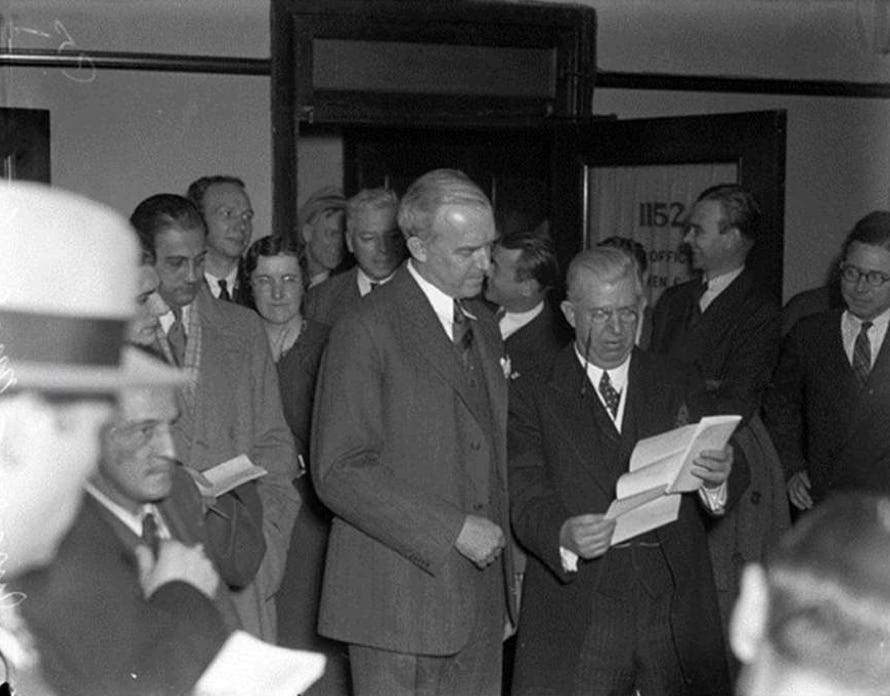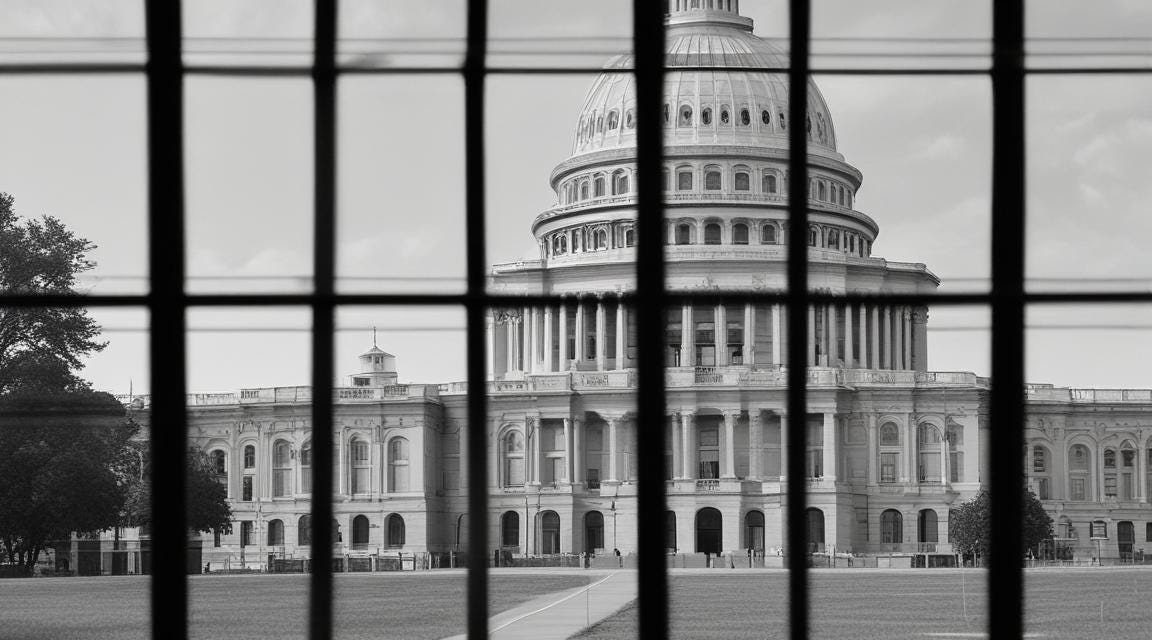Can Congress lock people up?
A guide to inherent contempt.
Early last week, Steve Bannon — the former chief strategist in Donald Trump’s White House — reported to a low-security federal prison in Danbury, Connecticut, to begin serving a four-month sentence.1
His placement behind bars came after a nearly three-year-long legal battle, which began with a subpoena from the House January 6th Committee in September 2021 and then — after he ignored the panel’s summons — continued with a congressional contempt vote in October 2021, a grand jury indictment in November 2021, a conviction in July 2022, a sentence in October 2022, and then a protracted appeals process which culminated with the Supreme Court denying his final bid for leniency last month.
But could the House have accelerated that whole process by merely putting him behind bars themselves? Theoretically, yes, they could have, by employing a rare power called inherent contempt. House Republicans are flirting with invoking that authority today against Attorney General Merrick Garland (although to levy a fine, not incarcerate him). How does this unique congressional power work? Allow me to explain:
These days, with legislative activity considerably slowed (and with opposing parties in charge of the House and the presidency), lawmakers spend a fair chunk of their time on congressional oversight, holding hearings and conducting investigations into the executive branch.
However, despite the outsized role oversight plays in the modern Congress — think the Trump-era Comey hearings or “what did the president know and when did he know it?” — it’s never explicitly mentioned in the Constitution. Instead, oversight is an implied power, drawn from the “Necessary and Proper Clause” (Article I, Section 8, Clause 18), which gives Congress the authority
to make all Laws which shall be necessary and proper for carrying into Execution the foregoing Powers, and all other Powers vested by this Constitution in the Government of the United States, or in any Department or Officer thereof.
For centuries, lawmakers have argued that they can’t execute these authorities without subpoenas/hearings/investigations/etc, and the courts have generally agreed. The first congressional investigation was conducted by the First Congress, an examination of revolutionary financier Robert Morris in 1790, and it was off to the races from there.
Still, for almost as long as Congress has been issuing subpoenas, people have been ignoring them. Since the 18th century, lawmakers have responded by holding witnesses in contempt of Congress when they fail to appear before a congressional committee or supply requested documents.2 Congressional contempt can take three forms:
Criminal contempt, in which a chamber of Congress votes to refer a would-be witness to the Justice Department and asks the DOJ to prosecute them. This is what House Democrats did with Bannon; House Republicans also recently did the same with Garland.
Civil contempt, in which a chamber of Congress files a civil lawsuit against the target in an attempt to force compliance.
Inherent contempt, in which a chamber of Congress takes matters into their own hands, by arresting the mischief-maker or (in today’s case) fining them.
Of the three forms of contempt, inherent contempt is the rarest — but also the oldest. U.S. lawmakers (borrowing from their British parliamentary counterparts) first held someone in inherent contempt in 1795, arresting a businessman named Robert Randal who had been accused of bribing members of Congress. (He was released a few days later.) It wasn’t until 1857 that the process behind contempt citations, which is now more commonly used, came to be.
In the meantime, the Supreme Court has repeatedly upheld Congress’ inherent contempt powers, most notably in the 1934 case Jurney v. MacCracken, which involved the country’s first aviation regulator, Assistant Commerce Secretary William MacCracken, who had been accused of overseeing the destruction of subpoenaed documents.
When MacCracken refused to appear before a Senate committee to testify, the chamber approved an arrest warrant empowering Senate Sergeant at Arms Charles Jurney to haul him in “dead or alive.” MacCracken went into hiding, as Jurney searched for him in his home and office; eventually, MacCracken turned himself in by arriving at Jurney’s apartment.
There’s no Capitol jail, contrary to popular belief, so MacCracken was held prisoner at the Willard Hotel while the Senate held a full contempt trial, with Vice President John Nance Garner presiding. “William P. MacCracken slept tonight in Senate custody — slept in the watchful care of his trusty bunkmate, Sergeant at Arms Chesley W. Jurney, following a day of such legal and legislative burlesque as seldom, if ever, has graced the pages of congressional or court records,” the Chicago Tribune reported after the trial’s first day.3

Eventually, the Senate voted to find MacCracken guilty of contempt of Congress, sentencing him to 10 days in a D.C. jail. (His meals in jail consisted of “cold shoulder, cheese, fried pineapple, creamed potatoes, fruit, jello and coffee,” the Washington Post reported at the time.) MacCracken appealed to the Supreme Court, which found in the Senate’s favor. If someone acts to “obstruct the legislative process,” Justice Louis Brandeis wrote for a unanimous court, Congress is allowed to punish them.
Despite that judicial seal of approval, lawmakers have not invoked inherent contempt since the MacCracken case in 1934, preferring to leave the prosecuting-and-sentencing to the executive and judicial branches, respectively.
Until today?
House Republicans have been sparring with Garland for several months now over the audio recording of Special Counsel Robert Hur’s interview with President Biden, which was subpoenaed by the House Judiciary Committee in February.4
The House GOP has now used two of the forms of contempt, starting with a criminal referral, and then — when the DOJ declined to prosecute its own boss (that would make for some awkward water cooler conversation!) — filing a civil lawsuit.
Rep. Anna Paulina Luna (R-FL), a House Freedom Caucus member, wants the chamber to go even further. She is expected to force a vote today on a resolution that would hold Garland in inherent contempt and fine him $10,000 a day until he complies with the subpoena. “Congress must never rely on the actions of the other branches,” Luna wrote in a letter to colleagues, adding: “We must remain vigilant and assert our authority to ensure the balance of power in our republic.”
Luna’s measure originally called for jailing Garland, but she lowered the punishment after facing internal GOP opposition. (No fried pineapple for Garland, I guess!) House Republican leaders, including Speaker Mike Johnson (R-LA), remain hesitant about the resolution, but they are expected to support it. “If it’s brought to the floor, I will vote for it,” Johnson told reporters, even after conceding that the measure gave him “a little pause” as a “former constitutional law litigator.”
It is unclear if the resolution has enough Republican support to pass — moderate Republicans are understandably queasy about the optics of fining the attorney general — and, even if it does, it will surely spark a legal battle of its own.
Neither chamber of Congress has ever used its inherent contempt power to levy a fine, although the Supreme Court has ruled in another decision (Anderson v. Dunn, 1821) that Congress’ contempt powers include both “fine and imprisonment.”
If the House does pass Luna’s resolution, Garland will likely argue that he is protected by executive privilege, the right of the president (also recognized by the Supreme Court) to withhold certain documents from Congress and the courts. Biden has invoked executive privilege on the Hur audio, although it would ultimately be up to the courts to decide whether the invocation is legitimate.
The Biden Files, Day 13
Meanwhile, on the other side of the aisle, congressional Democrats wrestling over Biden’s place on the presidential ticket seemed to move a new stage of grief on Tuesday: from bargaining to depression.
House and Senate Democrats met for their first caucus meetings since the Trump-Biden debate, and the vibe was “very somber,” per Punchbowl News. Asked if the mood in the room was similar to a funeral, one House Democrat told Semafor: “That is an insult to funerals.”
According to Axios, “actual tears” were shed at a smaller meeting of swing-district House Democrats earlier in the day.
Still, despite doubts from their rank-and-file, Democratic leaders in both chambers affirmed that they are sticking with their party’s embattled presumptive nominee. “I support President Joe Biden and the Democratic ticket,” House Minority Leader Hakeem Jeffries (D-NY) told reporters. “I’m with Joe,” Senate Majority Leader Chuck Schumer (D-NY) said three times at a Tuesday press conference.
With those proclamations, the ditch-Biden boomlet has mostly deflated. One more House Democrat — Rep. Mikie Sherrill (D-NY) — publicly called on Biden to withdraw, but other than that, this New York Times headline pretty much sums it up: “On Capitol Hill, Democrats Panic About Biden but Do Nothing.” “I wish I was more brave,” one Democratic state party chair (anonymously) told NBC News.
As they come to grips with a Biden-led ticket, many Hill Democrats expressed deep fears about their party’s chances in November. According to CNN, Sens. Sherrod Brown (D-OH) and Jon Tester (D-MT) — two of the most vulnerable Senate Democrats up for re-election this year — both said at their party huddle that they don’t think Biden can be re-elected. “Donald Trump is on track, I think, to win this election and maybe win it by a landslide,” said Sen. Michael Bennet (D-CO).
By day’s end, another blow had arrived for Democrats: Cook Political Report, the highly respected political forecaster, made six changes to its Electoral College ratings, all of them favoring Trump. Arizona, Georgia, and Nevada were moved from “Tossup” to “Lean Republican,” while Minnesota, New Hampshire, and Nebraska’s 2nd congressional district were moved from “Likely Democrat” to “Lean Democrat.” Biden won all six jurisdictions in 2020.
What else you should know
🩺 The White House was forced to walk back another false claim about the president’s doctors on Tuesday, admitting that Dr. Kevin Cannard, a neurological expert, met with Dr. Kevin O’Connor, the president’s top doctor, about Biden in January. (Press secretary Karine Jean-Pierre had previously asserted otherwise.) Meanwhile, O’Connor is facing questions about a business venture he discussed (but did not pursue) with the president’s brother in 2017.
📞 In an interview with the Houston Chronicle, Biden blamed Gov. Greg Abbott (R-TX) and Lt. Gov. Dan Patrick (R-TX) for the slow federal response to Hurricane Beryl, saying he had been unable to connect with either man about approving an official disaster declaration for Texas. The declaration was later delivered after Biden spoke with Patrick, who denied the president’s account.
📸 ABC’s George Stephanopoulos, fresh off of his recent interview with Biden, was captured on video by TMZ saying that he doesn’t think the president “can serve four more years.” Stephanopoulos later confirmed the comment, saying he “shouldn’t have” responded.
🐘 While Democrats scramble, Republicans are falling in line. Nikki Haley formally released her delegates and encouraged them to vote for Trump during next week’s Republican convention. “The nominating convention is a time for Republican unity,” she said.
👀 Some Democrats are already gaming out a potential Kamala Harris candidacy, per the New York Times. According to the report, Gov. Roy Cooper (D-NC) is seen as the lead contender to be Harris’ running mate in this hypothetical, with Govs. Andy Beshear (D-KY) and Josh Shapiro (D-PA) regarded as other options.
❄️ Jim Inhofe, a Republican who represented Oklahoma in the Senate from 1994 to 2023, died on Tuesday at the age of 89. Inhofe was perhaps best known for his avowed denial of climate change, including throwing a snowball on the Senate floor in an attempt to prove that the planet wasn’t warming.
📱 NATO is reaching out to influencers.
Today in D.C.
Biden: The president will meet with union leaders at the AFL-CIO Headquarters, before participating in meetings as part of the NATO Summit, including a sit-down with newly elected UK Prime Minister Keir Starmer. Later, Biden will host a White House dinner for NATO leaders and their partners.
Harris: The VP will deliver remarks at the Alpha Kappa Alpha sorority’s 71st annual convention (called a Boulé) in Dallas, Texas. Harris was a remember of AKA at Howard University.
Senate: The upper chamber will hold a procedural vote on the Reproductive Freedom for Women Act, which would codify Roe v. Wade into law. The chamber will also vote to confirm a new judge to the D.C. Superior Court and a new member to the Federal Labor Relations Authority.
House: The lower chamber will vote on the Safeguard American Voter Eligibility Act, which would require Americans to provide documentary proof of their U.S. citizenship before registering to vote in federal elections.
Before I go…
Here’s something fun: 27-year-old Dion Thompson-Davoli has run on every street in Washington, D.C. — all 1,838 of them. (With exceptions for highways and the highly guarded street where the Obamas lived. The Secret Service wouldn’t let him.)
“It kind of became a labor of love,” he told the Washington Post. “And I figured since I’m in Washington and everything’s pretty accessible around here — I bike and take the train — I might as well try to hit them all.”
Read more via the Washington Post (free gift link!)
Fun fact: FCI Danbury, where Bannon is serving, is the prison that Netflix’s “Orange is the New Black” was based on.
You also won’t find anything about “contempt of Congress” in the Constitution. Again, an implied power.
Another data point for my thesis that American politics has never been normal, I’d argue.
The legal battle predates Biden’s disastrous debate performance, but it has taken on fresh meaning since. Recall that the interview led Hur to conclude that a jury would perceive Biden as “a sympathetic, well-meaning, elderly man with a poor memory.” If audio of that interview came out now, it could add fuel to the fire for Democrats calling for Biden to drop out.





You should correct two errors. First, the constitutional source of Congress's oversight power is not the "necessary and proper Clause," but rather the vesting Clause of Article I. The exercise of legislative oversight is a "legislative Power" so by virtue of the vesting clause it is "vested" by the Constitution in the House and Senate of the United States.
Second, your description of the 1934 inherent contempt of William P. MacCracken, Jr., makes it seem like he was an executive branch official at the time. He wasn't. He had served as Asst. Sec. of Commerce, but only until 1929. By 1934 he was a private lawyer who had been asked by the Postmaster General to mediate an agreement between air carriers and the Post Office consolidating air mail routes into transcontinental networks. It was allegations over destruction of documents related to those contracts that led to his inherent contempt of Congress.
Be careful what you wish for...
"If audio of that interview came out now, it could add fuel to the fire for Democrats calling for Biden to drop out."
I kind of wish the mean-spirited House Freedom Caucus member Rep. Anna Paulina Luna would get her wish, force the AG to give up the tape, causing Biden to resign, some other Dem to beat Trump with the side affect that Dems win the House rendering her remaining time in Congress meaningless.